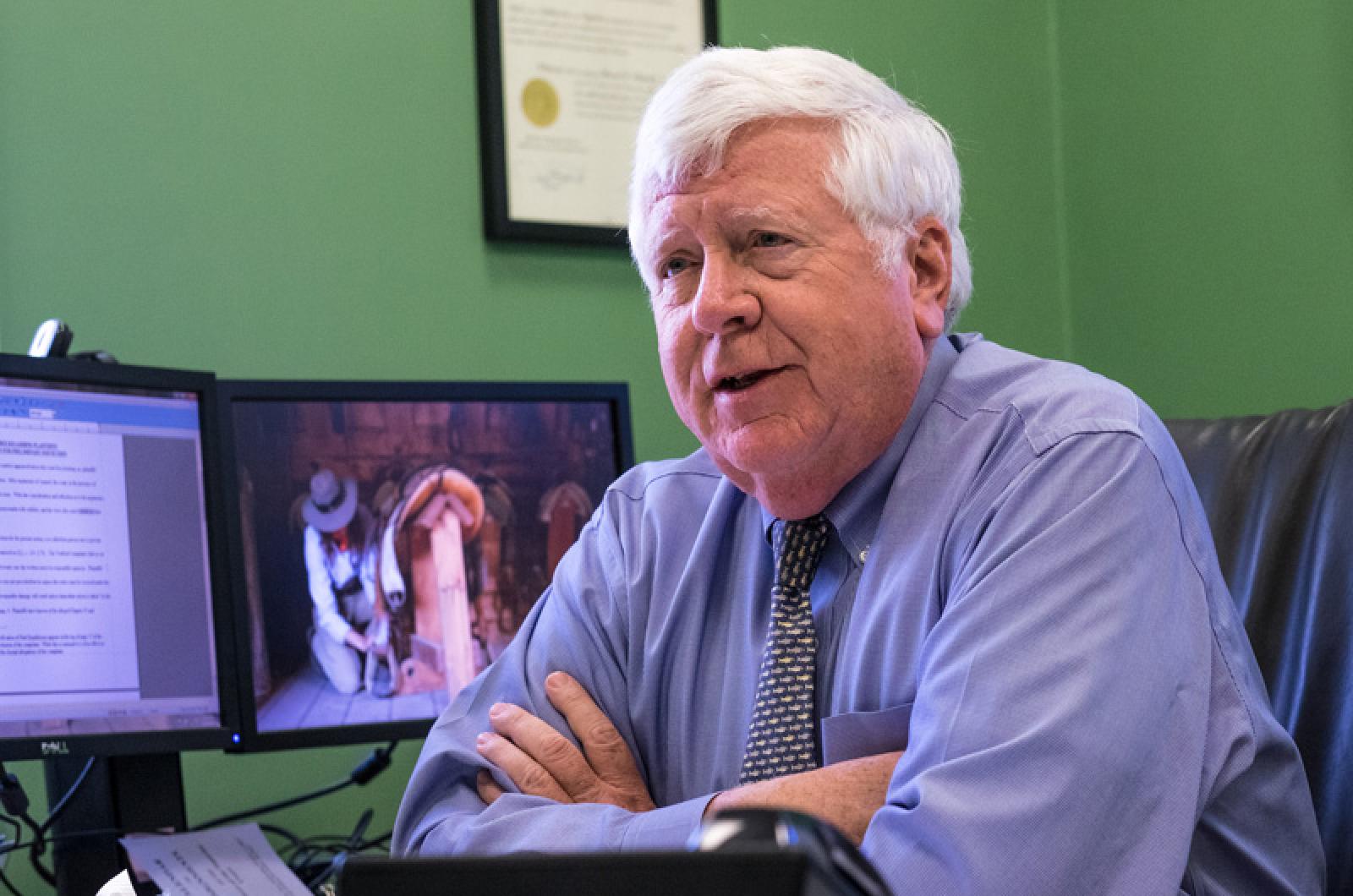The Hon. Gary A. Nickerson sits in his cramped chambers at the Edgartown courthouse, a gregarious bear of a man with a shock of white hair and a quick smile. Laughter comes easily to the associate justice of the superior court, despite the weight on his robed shoulders in deciding thorny issues of law. He seems to exude exactly what you might want in a judge, an authoritative, contemplative streak of wisdom in approaching matters of the judiciary.
It comes from a broad background in the law. His journey has taken him to the district attorney’s office, the U.S. attorney’s office, private practice as a defense attorney and personal injury lawyer, and finally a judgeship.
For the Barnstable resident, a fair part of that journey included the Edgartown courthouse.
“I’ve been rattling around in this building in one capacity or another for over 40 years,” he said in an interview last Friday during a break in superior court. “What you’ve got in this building is you’ve got good people. You’ve got fabulous people. Joe Sollitto (Dukes County superior court clerk-magistrate) is one of my heroes, in terms of his patience, certainly his knowledge of the local lore and the local ways. It’s very interesting to come over here and be part of it.”
Born in Taunton and raised on what he described as the remnants of a dairy and chicken farm, Judge Nickerson developed an interest in the environment as a young man. He was graduated from the University of Massachusetts with a degree in agriculture, with an eye toward issues far beyond his native Massachusetts.
“I had the experience of being close to the land,” he said. “I reached a point in my life when I really wanted to work on agricultural development issues in the third world. But somehow I veered off. A very influential professor said you know, you ought to consider law school. I took that turn.”
He said the turn was a wonderful fork in the road of life. It led him to Northeastern Law School, where his interest in the environment manifested itself in cooperative education assignments to The Association for the Preservation of Cape Cod, and Boston Edison.
His first position upon graduation was a fellowship with the Woods Hole Oceanographic Institution, where he worked to absorb the scientific work, while helping to advise the scientists on legal matters. His intent was a career in environmental law, but in another fortuitous fork in the road, he got a job offer from the Cape and Islands district attorney’s office, where he also worked as a co-op student from Northeastern University.
“It occurred to me that if I was going to save trees, I’d better learn how to try a case,” he said. “It never occurred to me that trying cases would generate so much paper that you’re killing trees.”
While working as an assistant district attorney, Judge Nickerson participated in some important cases, including several that established new law.
“I had two cases make it to the Supreme Court, and both of them made substantial law,” Judge Nickerson said. “While I wrote the briefs, I never got the chance to argue at the U.S. Supreme Court. Both cases were decided by the court on the papers without oral argument. One of the cases was probably one of the leading cases in Massachusetts jurisprudence, establishing quite firmly the idea that our state constitution can provide significant protections to the citizenry, that are stronger than the United States Constitution.”
Next came a stint as special assistant to the United States Attorney for the District of Massachusetts. It was a drug case that originated on Martha’s Vineyard, and grew beyond state concerns to become a federal case. While in the U.S attorney’s office he worked with Robert Meuller, who went on to become the director of the FBI, and is currently special counsel heading the investigation into Russian meddling in the 2016 presidential election. He also worked with U.S. attorney William Weld, who later became the governor of Massachusetts,
Governor Weld named Judge Nickerson to his judicial nominating committee, where he helped screen prospective judges. One day while going over resumes, it occurred to him that his own might compare favorably.
In 1998, he was appointed to the bench by Gov. Paul Cellucci.
“I’ve always had a tremendous love of the superior court,” Judge Nickerson said. “There are people who love the superior court and are firmly of the belief that it’s the finest trial court in English and American jurisdictions. I’m not that boastful but it’s a pretty nice body of colleagues. It’s a great court. I wanted to aim for that.”
While on the superior court bench, Judge Nickerson has presided over some notable cases, including most recently, Commonwealth vs. Loya, in which a Coast Guardsman was accused of murdering another Coast Guardsman and shooting her spouse, as well as a Bourne police officer who responded to the scene.
Another notable trial was Commonwealth vs. McCowen in which a well known socialite was murdered in her Truro summer cottage. That trial caught the interest of people far beyond Massachusetts and was broadcast gavel to gavel on cable television.
“I learned more about the media than I did about the law in that case, Judge Nickerson said. “It was fascinating. You’re a lawyer, you understand there is a first amendment, you understand there is freedom of the press. But to put it into operation with thorny issues of, where does the interest of the jurors come into play, versus the interest of the press. These sort of issues were very much in play in that case.”
The judge has taken an interest in the effort to improve the county courthouse, enlisting the help of top court officials who are scheduled to visit Martha’s Vineyard in the near future.
“What I am trying to do is generate a dialogue, here on the Island, what the Island would like to see in the way of improvements in the courthouse,” he said.
He noted there is no room on the Vineyard to accommodate land court, and no facilities to handle a statewide initiative to expand the housing court to every county. There is not even an available conference room in the courthouse, leaving attorneys, clients, and defendants discussing cases in crowded hallways.
“When you live on an Island people know your business, but you don’t have to know that much of your business,” Judge Nickerson said. “We’re not out on the street corner saying come visit us, but when you need us we want to be able to serve you. Everyone should have equal access to justice. The present inability to get any disabled person to the second floor is outrageous. That’s where the courtroom is. It’s not tolerable. It’s not acceptable.”
There is a reason judges sit on a high bench, wear black robes and command the respect of honorific titles. Their nuanced decisions can ruin — or vindicate — a life. These matters weigh heavily.
“Every day. Every day. Of course it does,” Judge Nickerson said. “Judges when they get together often talk about this very issue. I had a very dear colleague who was starting to feel the weight more and more. He very wisely said it’s my time to retire. I think we all reach that point, whether it be age 70 when we have to go, or something short of that.”
The judge has learned, however, to offset the burdens of the bench with a wry, dry sense of humor.
“It keeps you sane,” he said. “A little bit of humor at times helps. If you can’t poke fun at yourself, that’s a pretty sour person. I enjoy working every day.”






Comments
Comment policy »